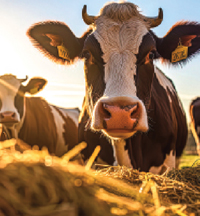By Emily Banks Wooten
[email protected]
(Editor’s Note: This is the fourth of a multi-part series exploring the variety of services offered by the Polk County Extension Office and Texas A&M AgriLife Extension Program and the impactful contributions made through these programs.)

Locally in 2023, 14,658 acres were harvested for hay, producing an estimated value of $1.8 million and an average cash rent for hay land of $22 per acre. Additionally, the estimated value of beef cattle in 2023 was $8.2 million with an average cash rent for pasture land of $9 per acre.
Because of this, beef and forage production is one of three major programs focused on by Matthew March, the Polk County Extension Agent for Agriculture and Natural Resources.
Production of forage species, mostly bahia grass and Bermuda, is harvested for hay to support the beef industry in Polk County and the Polk County Ag Committee recognized the importance of beef and forage production for the local economy and asked March to focus programming on this so he geared topics toward current issues or problems facing producers in the county.
“Severe to exponential drought conditions persisted throughout much of the growing season of 2022 and 2023, affecting hay production, hay and feed prices and forage availability. Many producers have faced decisions on how to remain profitable during the drought and what steps to take to ensure their operations remain viable in coming years,” March said.
“Additionally, high input cost over the last few years including fertilizer, herbicides and feed stuffs has caused additional financial strain to producers who are seeking to remain profitable through drought conditions and high input cost,” March said.
The response of the Texas A&M AgriLife Extension was to develop programming to not only educate beef and forage producers, but to provide producers the opportunity to improve the sustainability of their operations even during fluctuating cattle markets, adverse weather events, climate change and high input costs.
The Polk County Ag Committee, local producers, community members, industry support businesses and Polk County Farm Bureau were consulted and identified specific topics needing to be addressed and the target audience was cow calf producers, hay producers and new landowners with small herds of 25 or less head.
In addition to Polk County Farm Bureau, March also partnered and collaborated with Corteva, Bayer Crops Sciences, First Baptist Church and Mr. and Mrs. W.R. Baker.
In response, a beef and forage workshop allowed local producers the opportunity to hear from specialists on topics related to common management concerns in Polk County. This included managing pond weeds, stand decline in warm season pasture, cool season forages and beef cattle nutrition.
“By focusing on emergent and relevant management concerns, producers implement learned techniques on their operations and improve their operations’ sustainability,” March said.
A pesticide applicators certification and CEU course benefitted all local livestock and forage producers that wanted to utilize restricted use products in their operations.
“This program is essential for local producers, as restricted use products are necessary to manage certain pests in Polk County,” March said.
He said newsletters were important in reaching producers who were unable to attend in-person programming and that a focus was to work one on one with producers on management issues related to exponential drought conditions.
Four hundred fifty people received a quarterly newsletter with management recommendations. Two people participated in a pesticide certification course and 32 people participated in a recertification course. Ten people participated in a beef and forage workshop and 73 people participated in Cow County Congress in Madisonville.
March said the anticipated economic impact to local beef and forage operations from participants attending the beef and forage workshop, the Cow Country Congress and pesticide recertification course is $166,902.








Comment
Comments